| Reviews & Columns |
|
Reviews DVD TV on DVD Blu-ray 4K UHD International DVDs In Theaters Reviews by Studio Video Games Features Collector Series DVDs Easter Egg Database Interviews DVD Talk Radio Feature Articles Columns Anime Talk DVD Savant Horror DVDs The M.O.D. Squad Art House HD Talk Silent DVD
|
DVD Talk Forum |
|
|
| Resources |
|
DVD Price Search Customer Service #'s RCE Info Links |
|
Columns
|
|
|
Natalie Wood Collection (Splendor in the Grass, Inside Daisy Clover, Gypsy, Sex and the Single Girl, Cash McCall, Bombers B-52)
Warner Bros. has released the Natalie Wood Collection boxed set, featuring six of her studio contract films she starred in during the 1950s and 1960s: 1957's military/family drama Bombers B-52; 1960's high-finance romantic drama Cash McCall, 1961's beautiful, heartbreaking youth drama Splendor in the Grass; 1962's Broadway musical adaptation of Gypsy; 1964's sex comedy Sex and the Single Girl, and 1965's Hollywood-insider drama Inside Daisy Clover. Only Splendor in the Grass and Sex and the Single Girl are available separately from this set, while Splendor and Gypsy are touted as "remastered" from their original elements. Each title comes with a vintage Warner Bros. cartoon, as well as the original theatrical trailer, while Warners continues their practice (thankfully) of using original poster artwork for the hardshell DVD cases (is Warners the last studio to continue to release these bulky hardshell boxed sets?). Let's look at the individual films.
BOMBERS B-52
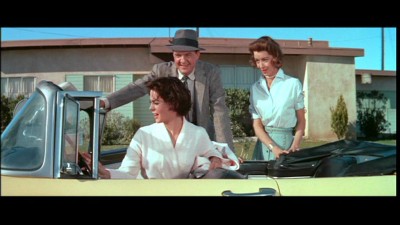
Korea, 1950. Sergeant Chuck Brennan (Karl Malden) has his hands full not only servicing the American jets that fly in "MiG Alley," but also dodging North Korean bullets and bombs at his forward position. The night-time arrival of arrogant, hot-shot pilot Captain Jim Herlihy (Efrem Zimbalist, Jr.) doesn't help matters when the Captain insists that Brennan repair his jet immediately - which would require that the service bay lights be kept on, providing an unmistakable target for the enemy. Sure enough, the service base is shelled after the Captain leaves, killing one of Brennan's men.
Flashforward to 1956 at Castle Air Force Base in California, home of the B-47 bomber. Brennan, now a Master Sergeant and the Line Chief for the base's repair crew, again has problems not only at work, but at home. His teenaged daughter, Lois (Natalie Wood), is ashamed of her father's work, particularly when it keeps them stuck in a lower-middle class income bracket, and when all of her father's Air Force buddies have long-left the service to become successful in the private sector. A sweet offer to run a factory from an old pal fails to impress Brennan, who sees it as someone's duty to keep the bombers flying, and in turn, keeping the United States safe. His wife, Edith (Marsha Hunt), is understanding and supports her husband's decision, but she also knows that Chuck is basically clueless when it comes to his daughter, who's no longer "daddy's little girl" who needs protecting. Even worse for the harried-at-home Chuck is the arrival of the base's new commander: Jim Herlihy, who's now a bird Colonel. Chuck decides right there to take his retirement - a decision confirmed when he learns Herlihy is dating is daughter - but Herlihy needs the talented Chuck to stay on, particularly when Castle is picked as the new home of the B-52 Stratofortress bomber.
SPOILERS ALERT!
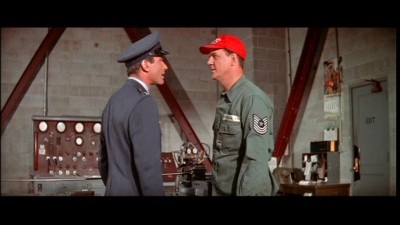
A confused hodgepodge of various genre conventions, Bombers B-52 was another required (and unwanted) contract job for Wood who worried (quite rightly) about the course of her career as Warner Bros.' number one young star. One of the very few child stars to successfully navigate the treacherous waters of not only studio politics but also audience fickleness, Wood had caused a sensation in Nicholas Ray's Rebel Without a Cause two years earlier, but other than a memorable supporting role in John Ford's The Searchers the year before, she had been stuck in TV guest spots and lightweight starring roles in studio fare like A Cry in the Night, The Burning Hills and The Girl He Left Behind, the last two featuring Tab Hunter, Warners' hot new teen heartthrob (who passed on starring a third time with Wood in this film). And Bombers B-52 wasn't any better, particularly for Wood who, after working with the gifted Ray, ached to stretch her acting talents in material that didn't require her to be essentially window dressing as the supportive girlfriend or daughter. She receives top billing here (she was probably Warners' most valuable contract player at the time), but she has less screen time than Malden, with her conflicted daughter subplot secondary to the Cold War machinations of the Malden/Zimbalist, Jr. actioner story.
As it is, Bombers B-52 plays like a cross between Rebel Without a Cause and Anthony Mann's Strategic Air Command. Scenes featuring men discussing their peace-time duty to their country versus the tensions such commitments create in their home lives, are alternated with domestic sequences with misunderstood Wood trying to make some kind of emotional connection with her dedicated, loving, but clueless (as to her emotional needs) father - all of which are punctuated with frequent, loving shots of the Air Force bombers and jets that circle the globe, protecting the free world. Perhaps in the hands of a better, stronger director, Bombers B-52's grab-bag assembly of various 1950s military and domestic drama clichés could have leap-frogged Irving Wallace's choppy script with a visual design and mise en scene that could have informed Bombers B-52 with some kind of interesting subtext. But genial studio contractee Gordon Douglas shoots it square and straight-ahead, without the slightest bit of commentary on the various thematic offshoots.
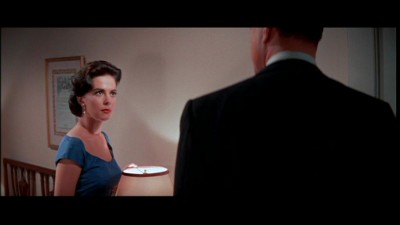
And there's certainly enough material to play with here in Bombers B-52. Malden's troubles are text-book Cold War '50s anxieties, including devotion to doing your country's duty versus keeping up with the Joneses (check out Malden's grim, bunker-like starter home); the belief that one's job, and its inherent importance, also reflects the importance of the man himself; the new duty of the United States military to prevent war through the continued advance of military technology (thereby facilitating an overwhelming deterrent to our enemies); and the barely submerged Oedipal conflict that rages between Malden and Zimbalist, Jr. (the poster got it right, even if the movie won't dare touch it directly: "A girl on the knife-edge of desire between two men of a B-52!" - one of those men being her father). Any of these themes, explored more carefully by the director, could have resulted in Bombers B-52 being an interesting 1950s Cold War artifact. But under Douglas' plodding direction and some suspect performances (Malden hams it up something fierce, Zimbalist is ineffectual either as a romantic lead or a tough military commander - only Wood manages a couple of good scenes where she convincingly essays a conflicted, loving teenager ), Bombers B-52 can't figure out what it is, moving from comedy to drama to actioner without any context. By the film's end, when the action takes over and the bomber catches on fire and Malden is forcibly ejected from the plane (don't ask), the viewer is reduced to spotting all the plot holes (not one CO2 fire extinguisher on the plane? Why did Zimbalist eject Malden when we know he's going to safely land the bomber? If we find Malden can talk after he's discovered by Zimbalist when he ejects from the bomber, why doesn't he just yell out when he hears Zimbalist calling for him, instead of tapping that little rock?) before the script ties up the loose ends, and Wood smiles up at the bomber formation flying in the sky. With these kinds of disposable early starring roles, it's no wonder Wood was perpetually anxious about her movie career.
CASH McCALL
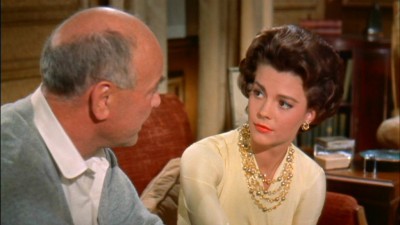
When plastics factory owner Grant Austen (Dean Jagger) is given the squeeze by long-time buyer General Andrew Danvers (Roland Winters), who in turns owns electronics giant Scoffield Instruments, Austen looks for a way to unload his company for some fast cash. Enter Cash McCall (James Garner), a seemingly unscrupulous wheeler-dealer who, if you believe the papers, buys up companies to destroy them, making a profit off their eventual parceling out (his last buy-out committed suicide - a tragedy that the newspapers want to attribute to Cash's cut-throat business ethics). Austen's management consultant, Gilmore Clark (Henry Jones) soon discovers that he actually works for Cash (his company is owned by the shadowy McCall), and eventually he joins McCall in a scheme - entirely legal - to get control of not only small Austen Plastics but also industry giant Scoffield Instruments. There's only one small problem: Austen's daughter, Lory (Natalie Wood). Lory and McCall had actually met the summer before, with their parting causing a great deal of emotional heartache for the young Lory. But McCall is determined to win her back...and seal the deals he's got planned for Austen and Danvers.
SPOILERS ALERT!
Another inconsequential studio vehicle for a barely utilized Wood, the slick but empty Cash McCall is James Garner's show all the way. A Warner Bros. contractee, as well, Garner already had a few starring roles under his belt (the war actioners Darby's Rangers and Up Periscope), but Cash McCall was designed specifically to capitalize on the delightful huckster/schemer/scammer persona he developed so memorably in his TV western series, Maverick, which ended the year Cash McCall came out. While the poster seems to suggest the film is a romantic comedy (reinforced by the film's opening animated credits and silly theme music by Max Steiner), except for a few isolated scenes where the drama wavers unsteadily into a comedic tone, Cash McCall comes off more like a lightweight variation of the office politics backstabbing of Robert Wise's 1954 Executive Suite - which isn't surprising when one sees that Cash McCall source novel was written by none other than Executive Suite's Cameron Hawley.
Cash McCall's plot, for its day, is fairly complicated, mechanically - the back-and-forth financial shenanigans that Cash perpetuates are nicely dense. However, the psychological games (and resulting tension) that were at play in Executive Suite aren't present here; while the logistics of Cash's various double-and-triple crosses are complicated, the motivations of Cash McCall's characters are not, unfortunately. While Cash's agreeably straightforward greed is refreshingly "modern" for 1960 ("I'm a thoroughly vulgar character. I enjoy making money,"), too much of Cash McCall reverts back to standard genre convention, including having Cash turn out to be scrupulously ethical in all his dealings, after all (ten years later, the Cash character would have screwed everybody over and laughed about it, to boot). He's not really an anti-hero in the same vein as say, William Holden in Stalag 17; if anything, he's discovered to be overly kind and generous with all the suckers he supposedly "swindles." Garner owns this kind of role, but he's surprisingly subdued here, and largely humorless, too, in a role that cries out for at least a modicum of gloating or playing to the audience. As for Wood, her role is so insignificant that any Warner starlet could have played it; she's saddled with a cardboard character, just like the rest of the unusually talented supporting cast (Nina Foch, Dean Jagger, E. G. Marshall, Otto Kruger, Edward Platt, and Parley Baer are all raring to go...with nothing to do). Cash McCall was yet another contract obligation, and her disinterest in it (along with her off-chemistry with Garner) is obvious.
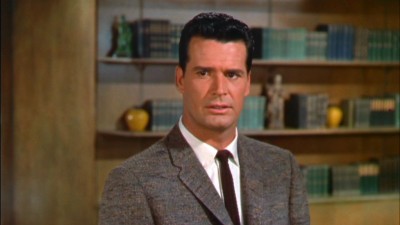
Not helping the rather staid, stagnant tone of the piece is director Joseph Pevney's unimaginative framing and blocking. One particularly egregious moment in Cash McCall - and a crucial one in the context of the screenplay - involves Garner recounting to Wood their first meeting. Told in flashback with Garner narrating, the sequence is shot with a ridiculously obtrusive fog around the edges of the shots (it often appears as if we're watching it through a steamed-up window), further distancing the audience from this critical exposition of the two characters. Perhaps this sequence was the result of post-production tampering (those scenes could have been shot as a standard flashback, and were chopped up and processed in editing), but even if it wasn't, one can tell that either way, these scenes are ridiculously mounted and executed (the close-ups of Garner's and Wood's lips before they kiss is hysterical). Although Pevney had previously excelled in the underrated Lon Cheney biopic, Man of a Thousand Faces, in 1957, his feature film output was for the most part undistinguished, and he eventually found a long career in largely anonymous TV directing assignments, where his invisibility worked to his advantage is series like Adam-12 and Emergency!. And not surprisingly, Cash McCall looks and plays like an extended TV episode. Everyone is placed in the center of the widescreen frame; close-ups and medium shots dominate, and the pace is perfectly suited to interruptions by commercials.
SPLENDOR IN THE GRASS
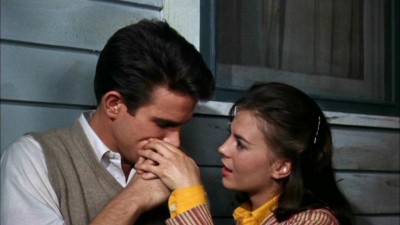
Young love in southeast Kansas, 1928. Sweet, innocent high schooler Deanie Loomis (Natalie Wood) is hopelessly in love with handsome star athlete, Bud Stamper (Warren Beatty), the son of the most prominent oil man in town, Ace Stamper (Pat Hingle). Bud loves Deanie, as well, but naturally, he wants to express that love physically with Deanie - as does she. But convention and social propriety keep them at arms' length. Deanie goes to her mother (Audrey Christie) for advice...and is told that no nice girl has those kinds of sexual feelings for a boy, and that a girl only allows a man to come near her after marriage for the purpose of children - just as she did and does with her father, kind, sweet, weak-willed Del Loomis (Fred Stewart). That doesn't stop Deanie's mother from desiring a match-up between Deanie and Bud, since Bud will one day be the richest man in town. Bud as well goes to his father for advice - or at least tries to talk with the blowhard Ace, but only manages to get talked to, as Ace tells him that he shouldn't do anything with Deanie because then he would have to marry her. And Ace has big plans for his boy, including going away to Yale - plans that don't include getting married to nobody Deanie and running one of Ace's old ranches, as Bud has said he wants to do.
Complicating matters for Bud is the return of his sister, Ginny (Barbara Loden), a flapper who's had an abortion and who can't stand the sight of her parents or the small little Kansas town. Ironically, she'd fit the bill of the kind of girl that Ace tells Bud he should get: one of the two kinds of girls that a boy meets when growing up...and the kind you don't marry. When it looks that Bud and Deanie can no longer keep their love and their passions under wraps, Bud ultimately heeds the words of his father and stops seeing Deanie (a decision helped by not wanting to hurt Deanie when he must use a "willing" girl to satisfy his sexual needs). His decision, ultimately, will have a catastrophic effect on both Bud's and Deanie's lives.
SPOILERS ALERT!
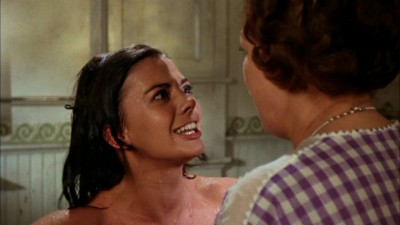
Still just as powerful and achingly poetic forty-seven years later, Splendor in the Grass features Wood's greatest film performance, an open-nerve, fearless turn that stands out even more prominently when one considers how often this actor was underutilized in unworthy films. Wood herself credited this remarkable showing to working with famed Method director Elia Kazan, a director who proceeded to strip away Wood's Hollywood veneer of expensive makeup, costumes, and her acquired false-front of facile starlet emoting to get at the powerful performer who was hungrily waiting to emerge. It was a performance and a film that Wood was justly proud of for the rest of her life; a level of performance, unfortunately, she wasn't asked to achieve again.
I don't know where Splendor in the Grass stands today with new university critics and historians who would probably view playwrite William Inge's Freudian explorations here with suspicion bordering on outright derision. Writer Camille Paglia recently lamented the intellectual rejection of Freudian subtexts and analysis in the popular culture, and certainly, you're not going to get very far in appreciating Splendor in the Grass if you don't go in for Oedipal and Electra, or Madonna-whore complexes. It's never foggy what Inge and Kazan (whose Method techniques approximated Freudian psychoanalysis) are getting at here. Bud can not see Deanie anymore because he truly loves her, and he doesn't want to hurt her by using another girl for his sexual needs. He can't integrate Deanie's sexuality with her status as a "good girl," either, not only because of the unyielding dichotomy of those two views, but also because of his own tortured view of his sister, Ginny, a "bad girl" he obviously loves, but whom stirs up uncomfortable feelings in Bud when he sees her used by other men, and when she calls into question Bud's own hypocrisy when he uses Juanita (Jan Norris). As for Deanie, the noxious advice she gets from her mother concerning men and sex just lays the ground work for Deanie's eventual mental breakdown when she first can't understand why Bud won't see her anymore, and second when she willingly goes against convention and offers herself to Bud (in the only manner she's learned is acceptable at this point: to become a "bad girl"), and he forcefully rejects her. Understanding for Deanie only comes after two and a half years of analysis at a mental hospital, where her doctor (Ivor Francis) tells her that she must accept her parents as they are, as humans that have failings and that are indeed the results (or perhaps, more appropriately, the "victims") of their own upbringings - all classic Freudian concepts.
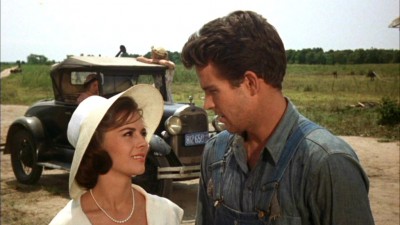
Reading that back, it somehow sounds as if Splendor in the Grass is terribly clinical and logical, but the effect of Splendor in the Grass is most decidedly not. Lyrical and poetic, Splendor in the Grass's bittersweet portrayal of young, uncomprehending, almost "mad" love is still one of the most potent and honest ones I've seen - particularly since today, such depictions of young love equate "honesty" of human emotion with graphic depictions of sexuality (as if the more "documentary" the approach, the more "true" the emotions - without the aesthetic make-over of shaping the material to achieve a truth higher than mere recording). Beatty, long before he became so cautious with his screen persona, is quite good as the frustrated Bud who longs to talk with his father, with anyone, who will listen and understand his problems (Kazan creates a marvelous counterpoint to all those kindly, understanding, wise 1961 TV doctors when he has Bud go to the appropriately-named Doc Smiley, played wonderfully by John McGovern, who just laughs at Bud's concerns and tells him blankly he doesn't know how to advise him). As for Wood, her performance is justifiably celebrated. Alternately naive and sweet, aroused and frustrated, unhinged and wise, her Deanie character shows an actress with an almost naked need to connect with the camera and to play this role truthfully. Her bathtub scene is a remarkable achievement in emotional hysteria (accentuated by Wood's absolute terror at putting her head under water, which of course, Kazan made her do), a stark cry for help and a declaration of madness that must have startled teen audiences back in 1961. Wood's final scenes with Beatty where she finally says goodbye to him and his memory, when Wood has achieved a level of forgiveness for her parents and for what has happened to her, and experiences her first truly adult, bittersweet understanding of irretrievable loss, are heartbreaking. Wood has a connection with the audience here - made believable by Kazan resolutely honest approach to the situation - that ranks with the best moments of cinematic American lyricism. Splendor in the Grass would be the absolute high point of Wood's film career.
GYPSY
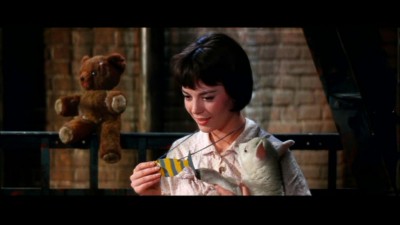
What a difference a director can make. In this adaptation of Jule Styne/Stephen Sondheim Broadway smash, Gypsy: A Musical Fable, Wood plays Louise Hovick, the shy, anonymous, "untalented" older daughter of "Mama" Rose Hovick (Rosalind Russell), the stage mother to end all stage mothers. Relentlessly pushing her younger daughter, June (Morgan Brittany, Ann Jillian), into the spotlight, Mama Rose pursues a show business career for her children with a vengeance - a vengeance that ignores the poverty they live in, the shiftless, unstructured home life she provides, and the negation of her own children's wants and needs in service of Mama's overriding desires. A chance meeting with former stage performer and now candy butcher Herbie Sommers (Karl Malden) encourages Rose not to stay put in her hometown Seattle, but to go back on the road and shepherd her daughters' act through the various vaudeville circuits. The road is long and hard, particularly with vaudeville dying as movies and Broadway take over - a fact not lost on young June, who has real talent and who is offered a chance to become a true Broadway star...as long as her pushy, overbearing stage mother isn't included in the package. Rose, saying the decision is best for her daughter (but it's in reality, best for Rose), says no, and pushes on to the fading vaudeville life. When events look their bleakest, when June and the rest of the act leaves, and when Rose faces the terror of actually settling down to a "normal" married life with Herbie, sweet, unassuming Louise unwittingly provides a last ditch, desperate lifeline for Mama Rose to return to the spotlight she's always craved, when Louise transforms herself into the seductive, glamorous stripper, Gypsy Rose Lee.
SPOILERS ALERT!
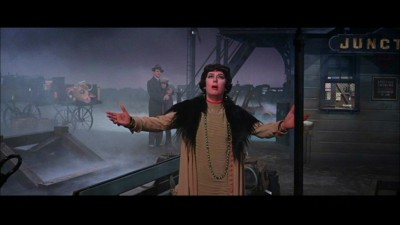
For the film version of a musical that many rank as one of the greatest in American theatre history, Gypsy commits the crime of merely being adequate - and a great deal of that adequacy already comes from the existing musical score. Gypsy the film does nothing to break out from under the weight of the critical and historical importance of the stage production, becoming ultimately, merely a recording of the various moments in the musical that meant so much more on the stage (I saw a revival of Gypsy on Broadway years ago, and I can assure you: the effect is light years removed from this stodgy cinematic rendering). If the main critical validation for Gypsy the movie is, "Well, at least you have that marvelous score," then the movie has failed; you can go and buy the original cast recording for that. The movie version has to stand on its own; it has to be an aesthetic experience that's not necessarily a copy of the stage experience, but one that succeeds in its own language - the language of movies. And Gypsy doesn't pull that off at all.
And it's not hard to see where the blame lies: right in director Mervyn LeRoy's lap. Much has been written about the miscasting of Rosalind Russell as Mama Rose, a role made iconic by the towering talent of Ethel Merman in the original stage production. The fairness of not letting Merman play the role on screen is basically beside the point. Rosalind's husband owned the film rights to Gypsy, and his wife came with the package: no Roz, no film (the studios, no doubt, would have probably gone with this arrangement regardless of the package, taking into account that Merman wasn't considered "box office," and Roz had had a huge hit back in 1958 with the film version of Auntie Mame). How Roz played the part is the point, and LeRoy either wouldn't reign her in, or decided it was fine for the picture (having read numerous accounts of LeRoy's on-set directing methods, the latter sounds right). Russell is brash and pushy and at full volume from minute one, leaving absolutely no air for anyone else in the picture, while also denying the character a chance to grow throughout the film. Obviously, the stage mother to end all stage mothers has to be pushy from the get-go of the story, but Russell's bulldozing performance isn't "pushy," it's homicidal, and lacks even the most basic subtlety or allowances for shading that would have deepened the performance.
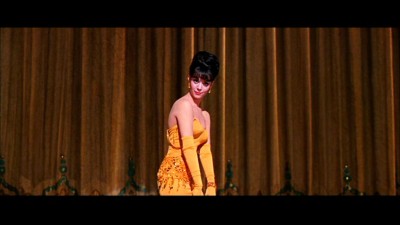
As for LeRoy's directing, it's hard to find any of it when you watch the square proscenium arch-framing he employs as he lets his performers shout dialogue at each other. Certainly, LeRoy's visual style was never all that dynamic, but this is recording, not directing - an adjective you could attribute to his directing of the performers, as well (according to most accounts). Apparently oblivious to the possibilities of the Technirama widescreen, LeRoy plants everyone in the center of the frame - or moves them to opposites sides - and just sits back and lets the cast go at it, with absolute no "directorial commentary" employed in the mise en scene or in the editing to let us know he directed it. Of course, this method of directing, this "classic American style" worked for LeRoy in other vehicles, but here, it deadens a musical that needs to be as dynamic - and as complicated - as the central character, Mama Rose. But it isn't, and the film falters badly because of that resolutely square handling by LeRoy. Wood, who has little to do until the very end of the picture, looks about as happy to be here as she did in Bombers B-52, and it's understandable, because LeRoy is obviously only interested in recording the musical numbers from back in the third row center. Thus, when Wood transforms herself into the glamorous stripper Gypsy Rose Lee, there's no accompanying transformative effect on the viewer - it's just another visually dead moment in a movie filled with them. The audience gets what it's been waiting for for two hours: the sight of the gorgeous Wood stripping, and even that LeRoy gets wrong, pulling the camera way, way back instead of going in nice and close on the sexy Wood. The real Gypsy Rose Lee may have instructed Wood on how to strip for this film, but LeRoy gets his directing cues from the Hays office for this outing: the justifiable famous sexiness and eroticism of Lee's stripping is utterly muted here...as is most of what made the stage version of Gypsy so important.
SEX AND THE SINGLE GIRL
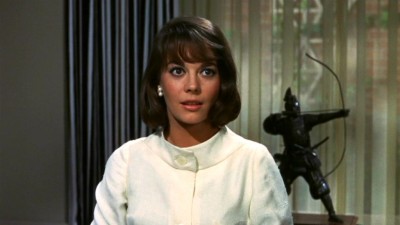
Utterly rotten-to-the-core magazine editor Bob Weston (Tony Curtis) has just the answer to keep sales up for the filthy rag he works for: a sizzling expose of the young author who wrote the bestselling sex guide, Sex and the Single Girl: Helen Gurley Brown (Natalie Wood). A noted research psychologist at the International Institute of Advanced Marital and Pre-Marital Studies, Brown is infuriated not only by Stop magazine's slanderous, salacious article about her (which stated she didn't know what she was talking about, because she was a virgin), but also by the treatment she's getting from her colleagues at the Institute, namely snide Dr. Rudy DeMeyer (Mel Ferrer), who now wonders if the gorgeous Dr. Brown really is or isn't a virgin (a suspicion that also turns on the previously oblivious Rudy). But how does Bob Weston, who has the reputation as the dirtiest-minded editor in America, get to the now-suspicious Brown for an interview? Simple. He pretends to be his next-door-neighbor, Frank Broderick (Henry Fonda). Frank, a stockings salesman, is in the midst of a standing 10-year fight with his shrewish wife, Sylvia (Lauren Bacall), who suspects that Frank is forever cheating on her. Thrown out of his house for the umpteenth time, Frank is given a lifeline by Bob, who uses his friend's dilemma as an "in" with Brown: Bob will tell Brown Frank's troubles, getting Frank free advice on his marriage while Bob has a chance to seduce Brown. Of course, things become complicated when Bob falls in love with Helen.
SPOILERS ALERT!
A pre-packaged "deal" picture if there ever was one, Sex and the Single Girl features mismatched stars (what the hell is staid Fonda doing in a 60s sex farce?), a compromised, largely unbelievable script (warmed over Doris Day antics, courtesy of Catch-22's Joseph Heller???), and tentative direction by a fading comic helmer (Richard Quine in serious decline). There are laughs in Sex and the Single Girl, particularly with Curtis' adept reaction shots and a surreal final car chase that works most of the time, but the overall impression left with the film is one of desperate striving for almost zero effect. Although not quite as bad as Wood's worst sixties' film, Penelope, Sex and the Single Girl seems worse because of the caliber of the talent involved. Curtis, a supremely gifted farceuer (I'd match his reaction shots against the very best in comedy), was already deeply entrenched in a career glide path that would eventually lead to drug addiction and sporadic TV and B-programmer work; films like Sex and the Single Girl were the last thing he needed at this point. Fonda, still a "name" but no longer able to carry a picture on that name alone, seems utterly befuddled as to what's required of him in a fast-paced sex farce (it's frankly embarrassing to see this talented actor put on a silly hat and mug for the camera); at least Curtis had the good sense to embrace this junk and play it "straight." Bacall, hopeless as ever in comedy, glowers like a lynx-eyed female impersonator and threatens bodily harm to anyone within the frame, achieving a measure of awkwardness that manages to best even Fonda's. And Wood...tries her best. She's lovely with a sexy wardrobe and sleek hairdo, and she seems to have good chemistry with the fast-patter Curtis (their seduction scene, done while she's drunk - always a tricky maneuver for an actor - is nicely erotic and funny), but what, exactly, is the actress from Splendor in the Grass doing in this piffle? There's nothing wrong with good piffle; don't misunderstand. But Wood's intensity at being alternately light and romantic and comedically frazzled, ultimately fails because she's too committed to "getting it right" as a actress, instead of loosening up as a comedianne.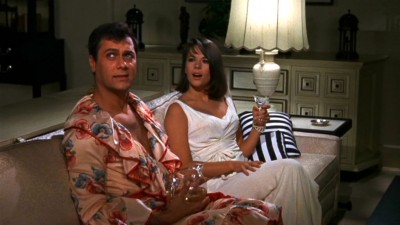
As for director Quine, a lot was expected of him with well-observed hits like Operation Mad Ball and Bell Book and Candle, but once Blake Edwards hit his stride with The Pink Panther, Quine played catch-up before splintering off into a diffuse career of anonymous dramas and eventually TV work. You can tell that Quine, playing off some of the funny elements of the Heller/David R. Schwartz screenplay, kind of has a handle on the material (being most assured in the several Curtis/Wood encounters), but eventually, he's thwarted by a central storyline that's unworkable, as well as by a comedy script with remarkably few actual funny lines. Bits like the pay washrooms at Stop magazine (including coin-operated mirrors) and other throwaway comedic business amuse, but we need dialogue that delivers laughs, too, and Sex and the Single Girl racks up a paltry score there. Only the final chase scene comes close to achieving a measure of originality, with the various cars chasing each other to the airport taking on the visual equivalence of the "musical bedrooms" of classic farce, with characters switching cars at random, while surreal elements like the pretzel business (at one point, some roadside pretzels are stolen, and incongruously, everyone indulges in some while speeding along) keep things interesting. But it's a case of too little, too late, and even with this promising sequence, Quine and the writers ultimately blow it when they let Larry Storch go on with an excruciating unfunny bit as a motorcycle cop (just as they blow other scenes by letting them get out of control, such as the drowning sequence, where Curtis winds up spitting out some fake and unfunny water via a hidden mouth hose). Sex and the Single Girl was doomed from the start; if it has any laughs, it's down to Curtis' amusing presence, and that's about it.
INSIDE DAISY CLOVER
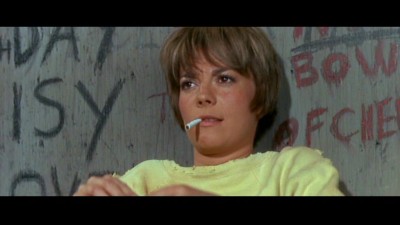
A misguided effort to return Wood to the glory days of Splendor in the Grass, this adaptation by Gavin Lambert of his own novel looks at the Hollywood "horror" story of feral urchin, Daisy Clover (Natalie Wood), a fifteen-year-old wild child who longs to sing in the movies (or at least we think she does; the minute she gets the chance to, though, she utterly rejects it without telling us why). Living with her flighty, mentally unstable mother, "The Dealer" (Ruth Gordon), Daisy cuts a record and sends it to the studio, and magically, she's signed to a contract - but not before the studio head, "The Prince of Darkness" Raymond Swan (Christopher Plummer), commits The Dealer to a mental hospital, to "clean up" Daisy's messy past (lest the papers find out her true, meager origins). Evidently, we're to assume that Hollywood is a soul-deadening place, because almost immediately, Daisy is rebelling against her "captors," seemingly finding an ally in the enigmatic screen hero, Wade Lewis (Robert Redford). But Daisy will soon discover that Wade is just as illusionary as Hollywood itself, leading Daisy down a path of madness and ultimately, personal rediscovery.
SPOILERS ALERT!
A constant staple in syndication in the '70s and later on TBS (who would show it about once a month for a while there in the 80s), Inside Daisy Clover has developed a minor, minor cult following by those viewers whom I can only assume haven't actually seen the film, or by those that get off on its easy symbolism and obvious irony ("Hollywood is bad. Rebels are good"). A typical Robert Mulligan production (in other words: pretentious, solemn and dreary), Inside Daisy Clover misses almost every mark it strives for, probably because its basic reason for existing is patently phoney from the get-go. Ostensibly an attack on Hollywood, and a celebration of the emerging anti-establishment counter-culture hero, Inside Daisy Clover, at the time a prestigious production with serious thoughts on its mind, comes off no better, no more profound, than another celebrated '60s expose of Hollywood and show biz, 1967's Valley of the Dolls, which then and now was written off as camp garbage. If anything, Valley is more honest in its aims, having the decency to wallow in its own indecency while openly trying to entertain its audience with crudities instead of lecturing to them. Inside Daisy Clover, on the other hand, is crushingly pious and self-righteous in its distaste for its own subject, which is doubly hilarious because the film itself is a product of what it seemingly despises - a big, stupid, pretentious piece of glop with facile ideas, gussied up with Hollywood gloss, trying to kill two opposing birds with the wrong stones: lecture the dopes in the aisles about the evils of Hollywood and "selling out," while hypocritically keeping them entertained with the various grotesqueries.
We never believe the central premise - that Daisy sings to keep the smell of the world down - because we never see "Daisy the singer" in the first place. Her pursuit of Hollywood fame is as shadowy as the shot showing her cutting her record in one of those coin-operated booths (laughingly foreshadowed with an ominous music cue as the camera tracks in on Wood's silhouette). Even funnier is once we see the actual "Daisy Clover, the singer," it's not even Wood singing; she's dubbed yet again in a film, and disastrously so (perhaps the film's supreme irony, hilariously lost on the filmmakers: their expose of fake Hollywood is illustrated by...a fake Hollywood singer). What's Daisy's beef, exactly, with the world, anyway? That's a good question - one that's not answered or even explored in the film. She's pissed off and annoyed from minute one in the film (so much for character growth here), so why does she want to "make a big noise" in Hollywood? And once she's in Hollywood, we never actually see what it is that turns her off that chance to make a big noise.
Of course, the film thinks it's awful that Swan would put Daisy's mother away, but it finds Swan's efforts to "make-over" Daisy equally heinous, which of course they aren't. So much of Inside Daisy Clover just assumes we understand that Hollywood is an evil place for sell-outs, that the filmmakers don't even bother to show us those evils in this empty shell of a film (and if it's assumed we already know the evils of Hollywood - what's the point of the film?). And when they do show us, they're piddling little evils, hardly worthy of our surprise. For some equally unexplained reason, we're supposed to pull for this plucky little street urchin rebel, but the filmmakers (and Wood) display the character as such an annoying cipher, we secretly start to root for the "suits" to ruin her - at least that would be more interesting in a prurient way than trying to figure out what the hell her frankly uninteresting problems are with the world. And is Daisy really that much of a "threat" to Hollywood and Swan that she must, ultimately, be destroyed? When she's thwarted in a way that upsets her (don't bother trying to figure out in what way - the film won't tell you), she...writes graffiti on the wall of a soundstage. A shark like Swan is going to be scared by that? She's not a "monstrous child," as Wade calls her, but a petulant brat - and a surprisingly inarticulate brat, at that, since we never get to hear what exactly she's pissed about. There's a scene later in the film where she confesses to her (dead) mother that she doesn't believe in anything anymore, which I assume the filmmakers thought was "heavy," but which really comes over as yet another non-event in the film - because when did we ever really know that she believed in anything?
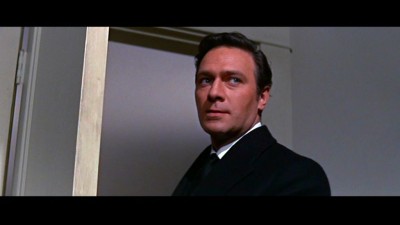
Despite its shadowy inarticulateness, does Inside Daisy Clover really think it has something important to say about Hollywood and conformity and the hypocrisies of the adult world? I recently watched a live TV version of Budd Schulberg's What Makes Sammy Run?, recorded six years before Inside Daisy Clover premiered, that was more "sensationalistic," more honest, more searing about Hollywood hypocrisies than Inside Daisy Clover could ever dream to be - and even that was old-hat by 1959. People have "got" the cliche that Hollywood is a den of inequity that kills people's souls, all behind a glittering facade of tinsel, since they first started making movies, but Inside Daisy Clover thinks it's inventing the wheel by lifting the lid off this Hollywood charade for supposedly the first time. There's also a not-so-subtle attempt to tie Inside Daisy Clover in with the emerging counter-culture (Daisy and her anachronistic graffiti, such as "Grope for Peace"), echoed by the film's trailer that states Inside Daisy Clover will be "the greatest put-down of the pay-off world since the movies." Yet this subtext is about as under-developed as the rest of the film's half-hearted themes, summed up ludicrously at the film's end when Daisy, after blowing up her beach house, tells a passing fisherman that, "someone declared war." What war would that be, exactly, Daisy? And what side are you on? Good luck finding out, viewer. There's nothing more amusing (and more pretentious) than millionaire Hollywood artists who live and die by playing the Hollywood game (Wood and Mulligan, for starters), attacking Hollywood and "the system" in their movies. So if you're going to beat up on Hollywood, your film had better be better than the results of the process you're attacking, which, of course, Inside Daisy Clover is not.
The supporting performances, good or bad, really don't matter once you factor in Wood's turn as the 15-year-old "hellion," Daisy. Plummer, floating through the deadened sets as if he's auditioning as Christopher Lee's replacement over at Hammer, at least gets a chance to put a point on his character's motivation (it turns out to be greed. Or is it sadism? Or jealousy? Or control issues? Or...oh, never mind), while Redford had the dubious distinction of creating a character that was supposedly butchered in post-production (most of those theories about the sexual orientation of Wade's character, and how editing "ruined" his place in the film, miss the central point: gay, straight, bi or neutered, Wade's character wouldn't have made any more sense in the deliberately hazy story than any other character here). No, perhaps Inside Daisy Clover biggest problem lies in the simple fact that Wood can't believably play Daisy. Simply put, she doesn't look remotely 15, nor is she directed with enough care here for us to momentarily put aside our disbelief with the character. She's always "Natalie Wood, Hollywood Star," further hampered by one of the worst hairstyles ever conceived for a supposedly juvenile character (there's a point in the film where almost-17-year-old Daisy says her hair is turning gray...ignoring the fact that it looked gray throughout the film with that ill-advised highlight-job). Even though she's actually 27 (and looking older than that), Wood doesn't help matters by playing Daisy in that studied aggressiveness of impatiently slapping things down on tables and mugging incessantly in a grotesque parody of adolescent willfulness that adult actors always think approximates youthful freedom (you know you're in trouble when a character describes Daisy as "Huck Finn" to cover Wood's awful performance). Supposedly, Wood went after Inside Daisy Clover, believing the project offered her a chance to return to the kind of adult psychological drama she excelled at in Splendor in the Grass. And she does have one, big showy scene (the kind Oscar always loves) where she flips out during a dubbing session. It's the film's best scene, admittedly, directed quite nicely by Mulligan, who utilizes the possibilities of the soundtrack as we alternately hear and not hear Daisy scream in her sound booth. Unfortunately, like most of the rest of Inside Daisy Clover's easy ideas about irony and profundity (Daisy sitting behind "jail bars" in Swan's office; cradling Dealer's head in the sand while the camera pulls back to reveal a "Lifeguard" chair; Wade wiping away the fakery of Hollywood as he wipes away Daisy's makeup), the scene is ultimately ruined with Mulligan adding in some faux-Psycho music over the endlessly looping reel of Daisy's rushes - just in case we didn't get the point of the scene in the first place.
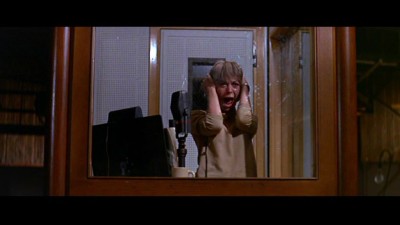
The DVD:
The Video:
To a film, the widescreen, anamorphic transfers for the Natalie Wood Collection are exceedingly good. The back of the hardshell cases state that Bombers B-52, Gypsy, and Inside Daisy Clover are presented in letterboxed widescreen, while Cash McCall, Splendor in the Grass, and Sex and the Single Girl are presented in matted widescreen, preserving what look like the correct aspect ratios. Compression issues are almost non-existent, while colors are correctly hued and acceptably saturated (although Bombers B-52 and Cash McCall can show color shifts and tending-to-red sequences). Images are razor sharp.
The Audio:
All films in the Natalie Wood Collection are presented here in their original English mono tracks, with the exception of Gypsy, which sports a Dolby Surround Stereo mix (it's adequate, but not a blowout, with directional effects minimal). Sex and the Single Girl has an optional Portugese mono language track, while all the films have optional English and French subtitles.
The Extras:
Original theatrical trailers are available for all films in the Natalie Wood Collection, along with a vintage Warner Bros. cartoon (appropriate for the year each feature was released) with each movie: Boyhood Daze, High Note, Beep Prepared, The Pied Piper of Guadalupe, Nelly's Folly, and War and Pieces are included. In addition, on the Gypsy disc, the two restored musical numbers, taken from 16mm elements that were included on the last video release of the film, are included here: You'll Never Get Away from Me, and Together Wherever We Go.
Final Thoughts:
It's tough to recommend the Natalie Wood Collection because only one of the films, the sublime Splendor in the Grass, is truly successful. The rest offer isolated pleasures (the score from Gypsy, Tony Curtis' mugging in Sex and the Single Girl, a few minutes of James Garner's performance in Cash McCall, maybe Christopher Plummer in Inside Daisy Clover), but you have to slog through quite a bit of tentative, misguided, or outright second-rate material to get to them. Fans of Wood obviously will want to purchase the Natalie Wood Collection, but since Splendor is offered separately, I would suggest a rental of the Natalie Wood Collection before committing to the rest of the films.
Paul Mavis is an internationally published film and television historian, a member of the Online Film Critics Society, and the author of The Espionage Filmography.


|
| Popular Reviews |
| Sponsored Links |
|
|
| Sponsored Links |
|
|
| Release List | Reviews | Shop | Newsletter | Forum | DVD Giveaways | Blu-Ray | Advertise |
|
Copyright 2024 DVDTalk.com All Rights Reserved. Legal Info, Privacy Policy, Terms of Use,
Manage Preferences,
Your Privacy Choices | |||||||















